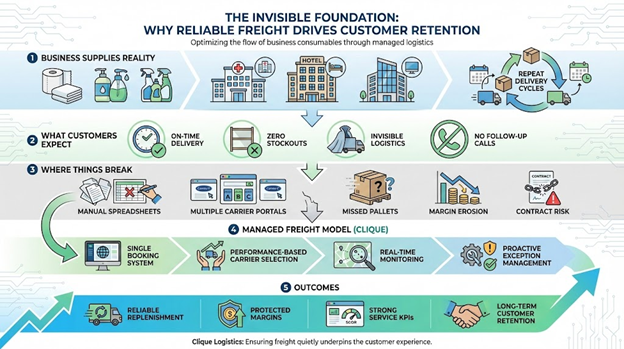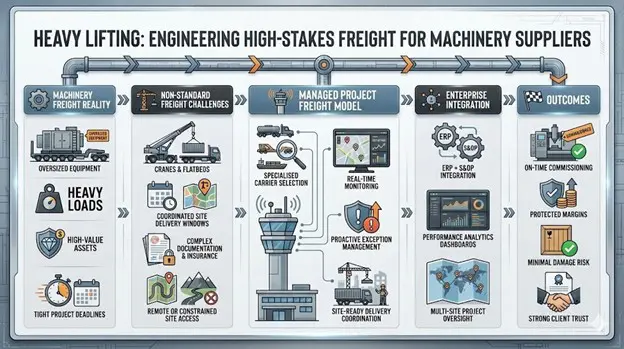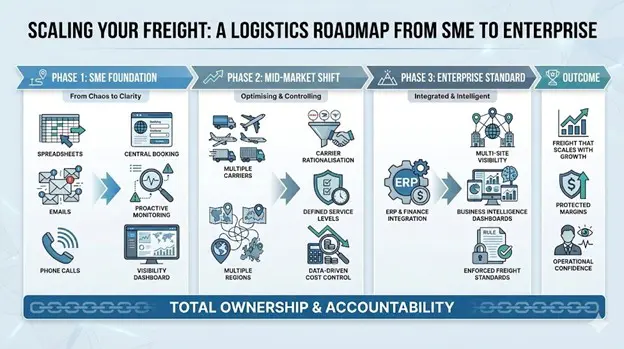As a freight dispatch business, we understand the complexities of managing goods in a rapidly evolving industry. From sustainability goals and labour shortages to technological advancements and shifting client expectations, staying ahead requires adaptability and strategic thinking. Here are some practical tips to help navigate these challenges and keep your freight operations running smoothly.
1. Collaborate on Sustainability Goals
Sustainability isn’t just a buzzword; it’s a necessity. We’ve found that collaboration is key to making meaningful progress:
- Consolidate Shipments: Coordinate with clients to group compatible loads, reducing the frequency of trips and improving efficiency.
- Green Transport Partners: Work with carriers that prioritise eco-friendly practices, such as using electric or low-emission vehicles.
- Sustainable Packaging Solutions: Encourage clients to adopt space-saving and recyclable packaging materials to optimise freight loads.
By integrating sustainability into dispatch processes, you not only help the environment but also enhance your brand reputation as a responsible partner.
2. Strengthen Relationships to Address Labour Challenges
Labour shortages in the transport industry can have ripple effects on freight dispatch, but building strong partnerships can mitigate these impacts:
- Diversified Carrier Networks: Establish relationships with a range of transport providers to maintain flexibility and reliability.
- Flexible Schedules for Drivers: Work with carriers to ensure driver-friendly schedules, encouraging retention and availability.
- Invest in Training: Equip your dispatch team with the skills needed to work efficiently with transport partners, especially during peak times.
Fostering strong partnerships ensures smoother operations even when labour challenges arise.
3. Leverage Technology to Streamline Dispatch
Technology is an essential tool for modern freight dispatch. Adopting smart solutions can significantly improve efficiency:
- Real-Time Freight Tracking: Use GPS and tracking tools to provide clients with accurate updates on shipment locations.
- Automated Scheduling: Implement AI-driven load-matching systems to pair shipments with available carriers quickly and effectively.
- Digital Documentation: Transition to paperless systems for invoices, manifests, and proofs of delivery to reduce errors and save time.
By embracing digital tools, you can streamline operations and provide a superior client experience.
4. Focus on Training and Upskilling Staff
As the industry evolves, having a well-trained team is more important than ever. Investing in your staff ensures that they’re prepared to tackle emerging challenges:
- Continuous Training: Provide ongoing education about industry trends, regulatory changes, and new technologies to keep your team at the forefront of best practices.
- Tech Literacy: Ensure your team is comfortable using new dispatch technologies, from load-matching software to GPS systems.
- Cross-Functional Skills: Encourage employees to gain knowledge in multiple areas of operations, fostering flexibility and problem-solving capabilities.
A skilled and adaptable team is the backbone of any successful freight dispatch business.
5. Meet High Consumer Expectations with Proactive Solutions
In 2025, clients will continue to expect fast, reliable, and tailored freight solutions. To exceed their expectations:
- Transparent Communication: Keep clients informed about shipment status and any potential delays with proactive updates.
- Customised Freight Services: Offer specialised options like temperature-controlled freight or express delivery to meet unique client needs.
- Feedback-Driven Improvements: Regularly gather client feedback to refine processes and ensure you’re delivering on their expectations.
Building strong client relationships through exceptional service sets you apart in a competitive industry.
6. Build Resilience Against Supply Chain Disruptions
Supply chain disruptions are an ongoing challenge, but resilience can be built through proactive measures:
- Diversify Partnerships: Work with a broad range of transport providers and logistics partners to minimise the impact of disruptions.
- Real-Time Monitoring: Use technology to track shipments and pre-emptively address delays or bottlenecks.
- Scenario Planning: Develop contingency plans for common disruptions, such as weather events or infrastructure delays, to minimise downtime.
Resilient operations help maintain trust and ensure the seamless movement of goods, even in uncertain times.
As a freight dispatch business, we understand that navigating these challenges requires more than just strategies—it takes collaboration, adaptability, and a commitment to excellence. By focusing on sustainability, technology, training, and client satisfaction, we can all rise to meet the challenges of 2025 and beyond.




